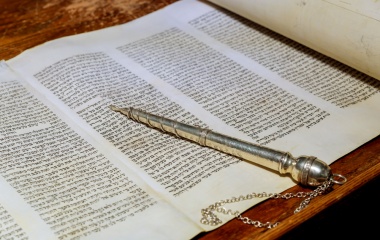
“These are the things that one eats the fruit of in this world and the principal remains in the world to come” (Shabbat 127a). Every morning as we begin to daven, we remind ourselves of many of the most important mitzvot of the Torah: honouring parents, acts of kindness, going to the study hall morning and evening, welcoming guests, visiting the sick, providing for brides, escorting the dead, thoughtful prayer, and promoting peace amongst people. We then conclude this beautiful teaching by stating “the study of Torah is equal to them all”.
The precise meaning of this phrase is open to interpretation, but at the very least it speaks to the importance of Jewish education. One of the unique aspects of Torah study – and one of the interpretations of this teaching – is that Torah study is both a means to an end and an end in itself. We study Torah in order to be able to observe Torah. One cannot keep shabbat if one does not study its myriad laws. We must study the laws of tzedaka to help guide us in determining how much and where we should allocate our donations.
In a similar vein, one must study medicine in order to know what Jewish law says regarding end of life care and so much more. For that matter one must be knowledgeable in the hard sciences to determine how we may or may not interact with technology on Shabbat. Studying for knowledge, so that one may know how to observe the Torah is the most basic and primary goal of Talmud Torah.
In a somewhat circular argument our Sages – after an intense, years long debate – reached the conclusion that “Torah study is greater than action - because study brings one to action”. Torah study is the pre-requisite, the enabler of action, but the goal is action, the fulfilment of Torah. So much so that the Rambam (Talmud Torah 4:1) rules that one is prohibited from teaching Torah to those who have no intention of observing it[1].
This aspect of study applies equally to men and women. And in many areas of law it is the women who will need to be more knowledgeable than the man. It is for this reason that women no less than men must say birchat haTorah, the blessing over the Torah each day. “An ignorant person cannot be pious” and all have an obligation to strive for piety. All must know Torah.
There is however a second aspect of Talmud Torah. Here the focus is not on knowing but on learning for the sake of learning itself[2]. “Eem bechukotai teileichu, If you follow My statutes and observe My commandments and perform them” then the Torah promises great reward. Commenting on the redundancy of “following” and “observing” the Torah, Rashi (re-)interprets the phrase eem bechukotai teileichu, not as a reference to the observance of mitzvot but to the obligation to be "ameleeim betorah", to toil, to work hard in the study of Torah.
Torah study is not just a practical guide, it requires engaging with the text, arguing over it, deciphering it, and applying it, irrespective of its practical application. We study not only with a chavruta, a partner but with generations before. It is the Talmud, the process of understanding the law that is the key text of Judaism, not the Shulchan Aruch, the code of practical Jewish law. Talmud study requires toil, hard work, sweat and even tears as one struggles to understand the text. One who has not struggled cannot fully appreciate or even fully understand the text.
Amazingly, one can study pages of Talmudic debate and yet reach no conclusion. It is the engagement with the text, that is so important. To listen in – and comment – on the debates of Reish Lakish and Rav Yochanan of Abaye and Rava. To decipher how the Rambam understood the discussion and try and answer a question of Rabbi Akiva Eiger. Practicality plays little role as one toils away in areas of Torah that no longer have any practical relevance.
There is an inevitable tension between these two aspects of Torah study. The hours spent trying to figure out a text, studying the laws of sacrifices, are hours in which one is not studying Torah to figure out how to observe it. Sadly, great Talmud scholars often have (relatively) limited knowledge of halacha, practical Jewish law.
Furthermore, hard work scares many away. We are an impatient generation, with little time for in-depth study. The 30 second sound bite is king, people much prefer to be spoon fed than to work hard. But working hard is part of Torah study. There is a reason my high school Talmud teacher did not allow us to use “Steinsaltz”. (The ArtScroll Talmud was years away)[3]. On the other hand there is little doubt that the Schottenstein Talmud and now the Koren has increased Torah study by millions, yes millions, of hours a week. What we have lost in toil we have gained in breadth. And no doubt many do struggle over an English translation of the Gemara.
How to balance the need for knowledge and the need for struggling with Torah is a challenge for all serious students of Torah. But we need to know Torah and we need to learn. May our doing so lead to the many blessings we will read this shabbat culminating with that of “I will give peace in your land”.
[1] Living in totally different religious, cultural and social milieu than the Rambam today pretty much the only way to reach out to the non-observant is to teach them Torah.
[2] It is this aspect of Talmud Torah that women are exempt from and until very recently had very little opportunity to do so. Baruch Hashem this is no longer the case even as we acknowledge the opportunities for women to learn for the sake of learning have room to grow.
[3] I recall my first day of high school where we did not start with a class but in the Beit Midrash with a chavruta where we were told to prepare the first part of Chezkat habatim, the third chatper of Bava Batra. To say I did not have a clue what to do would be an understatement. Yet we gained much and many of my high school friends are quite proficient in Gemara.



